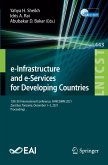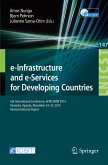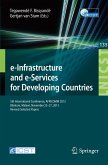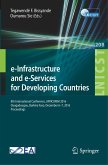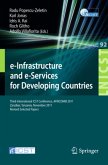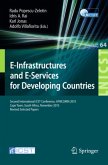This volume examines the needs, practices, experiences, peer support and accessibility of resources, both human and technical, for information technologies in developing countries. Seven main themes are presented in the book: experiences from a variety of national policies, strategies and initiatives; information technologies as tools for teaching and learning at all levels; the role of vocational education in information technology; information technology as a teaching subject; information technologies as tools for educational administration and support; building physical resources, skills and knowledge as well as access to those resources in developing countries; and action plans for proposed projects at local and national levels.
Deryn Watson CapBIT 97, Capacity Building for Information Technologies in Education in Developing Countries, from which this publication derives, was an invited IFIP working conference sponsored by Working Groups in secondary (WG 3. 1), elementary (WG 3. 5), and vocational and professional (WG 3. 4) education under the auspices ofIFIP Technical Committee for Education (TC3). The conference was held in Harare, Zimbabwe 25th - 29th August 1997. CapBIT '97 was the first time that the IFIP Technical Committee for Education had held a conference in a developing country. When the Computer Society of Zimbabwe offered to host the event, we determined that the location and conference topic reflect the importance of issues facing countries at all stages of developmen- especially Information Technologies (IT) development. Information Technologies have become, within a short time, one of the basic building blocks of modem industrial society. Understanding IT, and mastering basic skills and concepts of IT, are now regarded as part of the core education of all people around the world, alongside reading and writing. IT now permeates the business environment and underpins the success of modem corporations as well as providing government with cost-effective civil service systems. At the same time, the tools and technologies of IT are of value in the process of learning, and in the organisation and management of learning institutions.
Deryn Watson CapBIT 97, Capacity Building for Information Technologies in Education in Developing Countries, from which this publication derives, was an invited IFIP working conference sponsored by Working Groups in secondary (WG 3. 1), elementary (WG 3. 5), and vocational and professional (WG 3. 4) education under the auspices ofIFIP Technical Committee for Education (TC3). The conference was held in Harare, Zimbabwe 25th - 29th August 1997. CapBIT '97 was the first time that the IFIP Technical Committee for Education had held a conference in a developing country. When the Computer Society of Zimbabwe offered to host the event, we determined that the location and conference topic reflect the importance of issues facing countries at all stages of developmen- especially Information Technologies (IT) development. Information Technologies have become, within a short time, one of the basic building blocks of modem industrial society. Understanding IT, and mastering basic skills and concepts of IT, are now regarded as part of the core education of all people around the world, alongside reading and writing. IT now permeates the business environment and underpins the success of modem corporations as well as providing government with cost-effective civil service systems. At the same time, the tools and technologies of IT are of value in the process of learning, and in the organisation and management of learning institutions.



